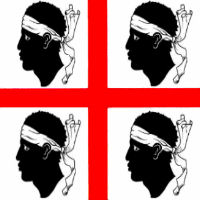0


















| Thumbs Up |
| Received: 2,755 Given: 1,407 |

Really surprising. You're preserving the old Indo-European word for house in fact, just like Russians do (there it's 'dom').
The rest of us can see in words like domestic or domicile.
There would be two more words for house in the Romance family: MANSION(E) and HOSTAL(E). While in Iberia and Italy they have specified their meanings, those are the words used for house in Northern France (French 'maison') and Southern France (Occitan 'ostal/ostau').
< La Catalogne peut se passer de l'univers entier, et ses voisins ne peuvent se passer d'elle. > Voltaire
















| Thumbs Up |
| Received: 2,755 Given: 1,407 |

Really surprising. You're preserving the old Indo-European word for house in fact (just like Russians do with 'dom').
The rest of us can see it in words like domestic or domicile.
There would be two more words for house in the Romance family: MANSION(E) and HOSTAL(E). While in Iberia and Italy they have specified their meanings, those are the words used for house in Northern France (French 'maison') and Southern France (Occitan 'ostal/ostau').
< La Catalogne peut se passer de l'univers entier, et ses voisins ne peuvent se passer d'elle. > Voltaire















| Thumbs Up |
| Received: 2,656 Given: 332 |

also in Sardinian there are words derivated from MANSIO-MANSIONIS
MASU = farm, or a country house, there is a village in south Sardinia with a Spanish name : "ELMAS" clearly EL MAS, while in Sardinian language the village is called "SU MASU" (the MANSIO)
MASSAIU = farmer, from Latin MANSIARIUS
MASONE = flock of sheeps
there are also other words used by sheperds
CUILE = from Latin CUBILE-CUBILIS, (in Italian could be translated as "ovile", sheperd's hut, or sheep's pen)
http://www.dizionario-latino.com/diz...emma=CUBILE100
PINNETU = ancient sheperd's hut, it's a round hut built with dry stone walls, and covered with tree branches or with a stone dome, they are identical to the ancient Nuragic huts; in certain zones they are still in use by sheperds or used for touristic purposes
some photos
http://www.ivansgualdini.it/wordpres...Su_Pinnetu.JPG
http://mw2.google.com/mw-panoramio/p...m/25194493.jpg
http://www.cibando.com/blog/wp-conte...2_777718_n.jpg
https://c1.staticflickr.com/7/6236/6...90e2fc76_z.jpg
http://mw2.google.com/mw-panoramio/p...um/3498661.jpg
instead I can't remember a word derivated from HOSTAL, while in Italian there is "OSTELLO" (Hostel)
Last edited by Mens-Sarda; 10-24-2014 at 10:05 AM.
















| Thumbs Up |
| Received: 2,755 Given: 1,407 |

Not Spanish, but Catalan. The mas (or masia) is the traditional farmhouse of the Catalans, probably a legacy from the Roman villas. They are as characteristic all over the Catalan lands (and related places, like Aragon or Provence) as cottages are for the English or chalets for the Swiss. Here I posted the typical parts of one.
< La Catalogne peut se passer de l'univers entier, et ses voisins ne peuvent se passer d'elle. > Voltaire















| Thumbs Up |
| Received: 2,656 Given: 332 |

I'm often surprised by certain similarities between certain English / German and Sardinian verbs or words, since in the past centuries, Sardinia had zero contacts with England or Germany, how the heck is possible? Certain common verbs or words seem to have a Latin origin, but others I have no idea
monkey -> moninca
to jump -> jumpare, jampare (to cross a river with a jump, to wade a river), normally "to jump" is translated with "brincare"
wade -> badu -> guado (Italian) -> vadus (Latin)
to mend (to fix a cloth, a shoe) -> mendare (to fix a roof or to close a hole in the roof), in Italian there is "rammendare" with the same meaning of the English verb -> Latin "emendare" (to fix)
to speak -> ispricare (the action of talking, the mouth's movement) -> sprechen (in German), could all of them come from the Latin "explicare" (to explain)? If we take the English verb and we modify it, it seems to match with "explicare", also the pronounce is 100% identical.
EXPLICARE -> (EX)SP(L)EAK(ARE)
















| Thumbs Up |
| Received: 2,755 Given: 1,407 |

They are related.
monkey (n.)
1520s, likely from an unrecorded Middle Low German *moneke or Middle Dutch *monnekijn, a colloquial word for "monkey," originally a diminutive of some Romanic word, compare French monne (16c.); Middle Italian monnicchio, from Old Italian monna; Spanish mona "ape, monkey."
Could be related.
jump (v.)
1520s, perhaps imitative (compare bump); another theory derives it from words in Gallo-Roman dialects of southwestern France (compare jumba "to rock, to balance, swing," yumpa "to rock"), picked up during English occupation in Hundred Years War. Superseded native leap, bound, and spring in most senses.
Related since Indo-European times.
English took it from us.
In this last word I don't think there is any 'genetic' relationship. Explicare comes from ex- + plicare, meaning to 'un- fold', so the root is plik-, from Indo-European plek-. The English verb has to do with a set of Germanic forms for it.
< La Catalogne peut se passer de l'univers entier, et ses voisins ne peuvent se passer d'elle. > Voltaire




| Thumbs Up |
| Received: 144 Given: 120 |















| Thumbs Up |
| Received: 32 Given: 43 |

Yeah, in (more or less) standard Italian there is also, with similar meaning, zompare (with a voiced /dz/, which could very well be related to Gallo-Romance forms with j-, if the Italian word is of Northern origin or transmission).
Of course! Compare Old English spræcan with German sprechen and so on - English just lost the r somehow.













| Thumbs Up |
| Received: 4,654 Given: 661 |

In the reality, the late-nomadic Vlachs (romanians) migrated from Bulgaria and South-Eastern Serbia to the present-day territory of Romania in the 13th century. The daco-romanian continuity myth is not generally accepted, that's why all major Western Encyclopedias (E.Encarta, E. Britannica, E.Americana, German Brockhaus, French Larousse etc...) mention the romanian state-supported daco-romanian myth, but they are also mention the reality: the Vlach migration from the Balkans in the 13th century..
Vlachs (medieval romanians) were the latest people who introduced the literacy in Europe, and they were one of the latest shepherd nomadic people in Europe. (There were no orthodox bishopry in medieval Vallachia Moldavia, most monks came from Serbia). Due to the lack of literacy and own history writting (chronicles) until the 15th century, the poor romanians had to built up a "speculative history-writting" (or fabricated history), where speculations based on earlier speculations and fictions etc..
There are no material proofs (cemetries cultic places) which can support the romanian (vlach) existence in present-day territory of romania before the 1200s. There are no CONTEMPORARY written documents about the existence Vlachs in the territory of later Vallachia Moldavia Transylvania before the 1200s.
WERE WERE YOU HIDING for 800 years dear "daco"-romans?
The neo-latin elements in Romanian language remain the best proof agaist daco-roman theory. Unlike other neo-latin languages, there are no proofs for development of dacian language into a neo-latin language, because there are not remained dacian vocabulary for the posterior. The dacian conquest was the shortest lasting conquest of the Roman Empire in Europe, it lasted only 160years, the relations between the roman legions and dacians remianed hostile. (Note: The contemporary multi-ethnic legionaries were Roman citizens, but they were recruited from various primarily multinational, non-Latin provinces, so THEY WERE NOT ROMANS ) This very short & hostile circumstance are not an ideal contingency for romanization process. There are no CONTEMPORARY historic records for the survive of dacians after the Roman withdrawal, and later the territory was the FOCAL POINT of great migrations (serials of many strong powerfull and brutal barbaric tribes and people such as Huns, Goths, Gepids Longobards, Avars, Pechenegs and Cumans.). There are tons of contemporary written documents (chronicles from early medieval to high medieval age etc.) about the sheprherd nomad Vlachs in Balkan peninsula, but there are no material or written proofs for their existence in the present-day territory of Romania before the 1200s. However the roman rule lasted for 500+ years in many territories of Balkan peninsula (where vlachs were often mentioned by many early medieval chronicles) There is also no trace of lingual influence from any of the other peoples who lived in Transylvania after the withdrawal of the Romans, the Huns, Goths, Gepids Longobards, Avars, Pechenegs and Cumans. If these languages did not have any influence on the Rumanian language, we can be sure that this is proof that at that time there were no Wallachian settlers in Transylvania.
The territory of later Wallachia region belonged to the Bulgarians first, later it came under Byzantine rule. Both Moldavia and Wallachia became occupied and ruled by the Cumans. Later your principalities became vassal state of the Hungarian kings and Polish kings, than romanians became an Ottoman province until 1878.
















| Thumbs Up |
| Received: 2,755 Given: 1,407 |

^ At least that thesis would explain why the Romanian language is not that far from the rest of Romance languages and not so dialectalized either as one would expect if it had really been spoken in present Romania unconnected from the rest for almost 2,000 years.
< La Catalogne peut se passer de l'univers entier, et ses voisins ne peuvent se passer d'elle. > Voltaire
There are currently 1 users browsing this thread. (0 members and 1 guests)
Bookmarks